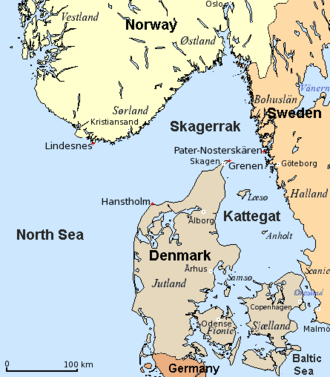Battle of Jutland
Battle of Jutland
The Battle of Jutland (31 May – 1 June 1916) was the largest naval battle and the only full-scale clash of battleships during World War I. It was fought between the Royal Navy's Grand Fleet, under Admiral Sir John Jellicoe, and the Imperial German Navy's High Seas Fleet, under Vice-Admiral Reinhard Scheer. The battle was fought in the North Sea, near the coast of Denmark's Jutland Peninsula. It was the most significant naval battle of World War I in terms of the numbers of battleships and battlecruisers engaged.
Background
The origins of the Battle of Jutland lay in the naval arms race between Britain and Germany in the years leading up to World War I. The Royal Navy had traditionally ruled the waves, but the rise of the Imperial German Navy posed a significant challenge to British naval supremacy. The strategic aim of the German fleet was to break the British naval blockade of Germany and to relieve the pressure on the German army fighting on two fronts.
The Battle
The battle commenced in the afternoon of 31 May 1916, with forces led by Vice-Admiral David Beatty encountering the German battlecruiser squadron commanded by Vice-Admiral Franz Hipper. Initial engagements favored the Germans, who managed to inflict significant damage on the British ships. However, as the Grand Fleet, commanded by Admiral Jellicoe, arrived on the scene, the numerical superiority of the British began to tell. The main battle fleet engagement occurred late in the day and into the night.
Despite the grand scale of the engagement, the battle was characterized by poor visibility, confused signals, and the limitations of period naval gunnery. These factors contributed to a somewhat inconclusive outcome, where both sides claimed victory. The British suffered higher losses in both ships and men, but the German fleet was effectively contained and remained a potent threat but not a decisive force for the remainder of the war.
Aftermath
The Battle of Jutland had significant strategic implications. Although the British public was initially dismayed at the heavy losses, the battle confirmed the effectiveness of the British naval blockade. The German High Seas Fleet, recognizing the difficulty of breaking the British blockade, increasingly turned to unrestricted submarine warfare as its primary naval strategy for the remainder of the war.
Legacy
The Battle of Jutland remains a subject of intense study and debate among naval historians. It highlighted the limitations of battleship-centric naval doctrine and the need for more comprehensive reconnaissance and communication strategies. The lessons learned from Jutland influenced naval tactics and ship design in the interwar period and into World War II.
Transform your life with W8MD's budget GLP-1 injections from $125.
W8MD offers a medical weight loss program to lose weight in Philadelphia. Our physician-supervised medical weight loss provides:
- Most insurances accepted or discounted self-pay rates. We will obtain insurance prior authorizations if needed.
- Generic GLP1 weight loss injections from $125 for the starting dose.
- Also offer prescription weight loss medications including Phentermine, Qsymia, Diethylpropion, Contrave etc.
NYC weight loss doctor appointments
Start your NYC weight loss journey today at our NYC medical weight loss and Philadelphia medical weight loss clinics.
- Call 718-946-5500 to lose weight in NYC or for medical weight loss in Philadelphia 215-676-2334.
- Tags:NYC medical weight loss, Philadelphia lose weight Zepbound NYC, Budget GLP1 weight loss injections, Wegovy Philadelphia, Wegovy NYC, Philadelphia medical weight loss, Brookly weight loss and Wegovy NYC
|
WikiMD's Wellness Encyclopedia |
| Let Food Be Thy Medicine Medicine Thy Food - Hippocrates |
Medical Disclaimer: WikiMD is not a substitute for professional medical advice. The information on WikiMD is provided as an information resource only, may be incorrect, outdated or misleading, and is not to be used or relied on for any diagnostic or treatment purposes. Please consult your health care provider before making any healthcare decisions or for guidance about a specific medical condition. WikiMD expressly disclaims responsibility, and shall have no liability, for any damages, loss, injury, or liability whatsoever suffered as a result of your reliance on the information contained in this site. By visiting this site you agree to the foregoing terms and conditions, which may from time to time be changed or supplemented by WikiMD. If you do not agree to the foregoing terms and conditions, you should not enter or use this site. See full disclaimer.
Credits:Most images are courtesy of Wikimedia commons, and templates, categories Wikipedia, licensed under CC BY SA or similar.
Contributors: Prab R. Tumpati, MD




